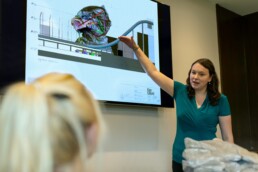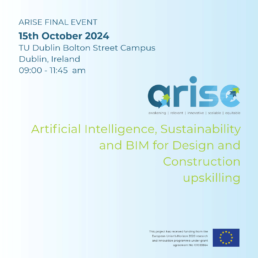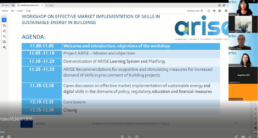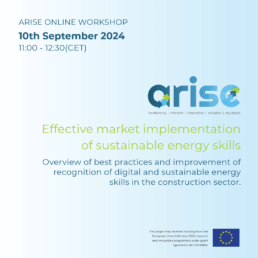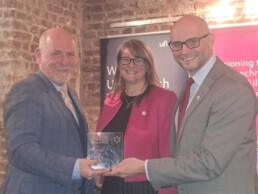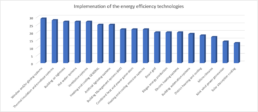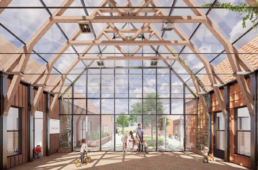Tackling the Lack of Young Professionals and Women in the Construction Industry
The construction industry has historically been, and largely remains, a male-dominated field marked by stark gender disparities. Despite advances in technology, innovation, and workplace safety, women hold only 6.6% of leadership positions in the sector in Italy, compared to 93.4% held by men, according to data from Unioncamere. While female employment in construction has seen modest growth, a significant imbalance persists, particularly in the low number of young professionals choosing careers in this field.

This situation is surprising, given that the construction industry offers a wide range of careers, many in developing technological fields, along with financially rewarding opportunities. With ongoing digital transformation and a growing emphasis on environmental sustainability, the sector has the potential to become more inclusive, accommodating diverse backgrounds, skills, and abilities. So, what barriers prevent the construction industry in Italy from becoming a more modern and inclusive field? And could these challenges have implications beyond Italy’s borders and within the EU?
Earlier this year, a survey from the European Project RES2 was circulated among key Italian stakeholders in the industry to explore perceptions of the gender and youth gap, with the goal of elaborating solutions to address these issues. The findings uncovered a range of stereotypes and negative perceptions surrounding careers in construction, along with several insightful suggestions for addressing these challenges.
A Glimpse into Gender Imbalance in Education and Work
The Paradox of Education and Female Employment in Italy
Data from Italia in Dati in 2022 reveals that while the number of graduates in Italy has increased, the percentage remains below the European average. Only 26.8% of 30-34-year-olds in Italy hold a degree, compared to the European average of 41.6%. Moreover, Italy shows a gender disparity in educational attainment, with the majority of graduates being women—an encouraging trend that paradoxically does not translate into equitable employment outcomes. The proportion of women graduates among the 25-64-year-old demographic is 23.1%, compared to 16.8% for men. Despite higher educational attainment, women in Italy face higher unemployment rates and pay disparities, with youth unemployment (ages 15-24) at a concerning 23.7% in 2022.
European Comparisons and Gender Disparities
In terms of unemployment rates and NEET (Not in Education, Employment, or Training) status for young people (ages 15-29), Italy ranks third in Europe for unemployment and second for NEET rates. Compared to the EU27 and EU28 averages, Italy’s labor market inclusion is notably low, while Sweden has achieved the highest employment rates.
Addressing Mismatches in Education and Employment
One reason for Italy’s elevated unemployment is a mismatch between workforce skills and market needs. The Italian economy has struggled to meet the demand for goods and services, leading to gaps in employment. Career guidance remains insufficient, especially during key educational transitions, resulting in a disconnect between academic preparation and industry needs. While STEM fields (Science, Technology, Engineering, and Mathematics) generally offer higher employment and pay prospects, the humanities remain a popular choice among Italian students, limiting opportunities in a digital world.
As of 2021, 24% of Italian 25-34-year-olds held a STEM degree, with a significant gender gap: 33.7% among men and only 17.6% among women. Meanwhile, in Germany, over 32% of young professionals have scientific qualifications, underscoring Italy’s challenges in aligning with Europe’s digital transformation.
Industry Stereotypes
Perceptions of Masculinity in Construction
According to the RES2 survey, the construction sector remains tethered to entrenched gender stereotypes, where women are often viewed as unsuited for roles in management, planning, and design. These biases stem from a misguided perception that men are more ambitious and better suited to leadership positions. The physically demanding nature of construction work—often involving strength, endurance, and challenging conditions—reinforces the stereotype that construction is inherently a "male domain." Unfortunately, these views discourage women from considering careers in construction and perpetuate resistance to inclusivity among employers.
Poor Working Conditions
Women qualified for office-based roles in construction often face significant challenges in achieving leadership positions due to persistent gender biases, a trend consistent across STEM fields in Italy. For field-based roles, particularly in Southern Italy, the situation is even more dire, with construction sites often perceived as dirty, unsafe, and poorly regulated. Media coverage of accidents and scandals—often linked to corruption—has further tarnished the sector's image. Additionally, market pressures and government policies aimed at cost-cutting have led to diminished safety and quality standards, creating a stagnant work environment resistant to innovation and inclusivity.
These poor working conditions perpetuate stereotypes, as some companies neglect safety and hygiene, assuming that a predominantly male workforce is more tolerant of harsh environments. This dynamic not only excludes women but also reinforces the stereotype of construction as a male-dominated field. Further complicating inclusivity is the lack of support for workers with caregiving responsibilities, stemming from traditional expectations that men will not require family-friendly policies.
Lack of Career Prospects and Innovation
In Southern Italy, the construction sector is often viewed as rigid and stagnant, with limited opportunities for growth. Small, family-run businesses frequently operate informally, reinforcing this perception. Additionally, a lack of government investment in training for skilled trades has led to a decline in essential roles such as electricians and welders. Young professionals may perceive these roles as lacking creativity and innovation—qualities increasingly valued by younger generations. This disconnect reflects a broader gap between young workers' ambitions and the opportunities available within the construction sector.
Recommendations for Industry Change
Collaboration Among Education, Public Administration, and Business Leaders
To tackle the persistence of gender stereotypes and exclusionary practices in construction, a multi-layered approach is necessary. Addressing these issues must start with early education, deconstructing gender stereotypes, and encouraging diverse career interests from a young age. One effective strategy is to eliminate the gender connotations associated with toys, games, and activities for children, allowing for a more gender-neutral perspective.
Collaboration among public administrators, business leaders, and educators is essential to promote cultural shifts that support inclusivity. Building strong partnerships between educational institutions and construction companies can facilitate internships, apprenticeships, and hands-on learning experiences, offering students a broader view of career possibilities within construction. Public events, such as career days at schools and universities, can further emphasize the creative and dynamic nature of construction work.

Promoting Career Pathways through Digital Tools
Enhancing perceptions of the construction industry can also be achieved through promoting career pathways utilizing digital tools. Schools can introduce design software that allows young students to digitally model apartments, showcasing the sector's intellectual and creative dimensions rather than just its manual labor aspects. Building Information Modeling (BIM), a collaborative tool widely used in construction, can serve as a cornerstone of construction education, helping students understand the integration of architectural, structural, and environmental elements.
Advancing Health and Safety
Modernizing the construction workforce requires prioritizing health and safety training. Integrating AI tools for real-time site monitoring and utilizing smart glasses for hands-free inspections can revolutionize safety practices, fostering a safer and more inclusive environment. Students can gain exposure to these technologies through industry events, allowing for hands-on learning and direct interaction with professionals.
Economic and Wage Reforms
To truly modernize the sector, wage reforms are essential. As demands for digital and environmental skills rise, workers should be compensated fairly for their expertise. Sustainable sector growth requires policies that consider workers’ social and economic well-being alongside industry innovation goals.
Conclusion
Addressing the deeply entrenched issues within the construction industry necessitates dismantling outdated stereotypes, improving working conditions, and expanding career prospects for women and young professionals. Schools and educational institutions should actively promote construction career options, while industry leaders must advocate for policy changes that align with workers’ needs.
Ultimately, the goal is to create a construction industry where women and young professionals can thrive—not merely as exceptions in a male-dominated field, but as pioneers of a more inclusive and forward-looking sector. Embracing these changes can pave the way for a construction industry that reflects the diverse talents of its workforce, advancing toward a truly equitable future.
The ARISE platform aims to promote the active participation and upskilling of individuals of all genders and ages in the construction industry. By using the ARISE platform, every professional in the construction sector can enhance their knowledge and skills conveniently online, no matter where they are.
https://www.youtube.com/watch?v=Z5B2k8loEqk&ab_channel=ARISEH2020
ARISE H2020 Final Event on “Artificial Intelligence, Sustainability and BIM for Design and Construction upskilling”
Date: 15 October 2024
Time: 9:00 - 11:45 (CET)
Place: TU Dublin Bolton Street Campus, Dublin, Ireland
Registration link: https://www.eventbrite.co.uk/e/arise-h2020-final-event-tickets-1033490426687?aff=oddtdtcreator
In October 2024, the ARISE project officially concludes, but before that, we have an exciting event lined up.
Artificial Intelligence, Sustainability, and BIM for Design and Construction upskilling is a half-day and in-person event taking place at TU Dublin, Ireland. Join us and learn about the ARISE e-learning platform and its content on BIM applied to energy efficiency and the next steps of Artificial Intelligence in construction.
About the Project
ARISE is a European-funded project (by H2020 Grant Agreement No 101033864), started in September 2021, that aims to support the upskilling of design and construction professionals on the topics of energy-efficient buildings and BIM processes.
ARISE’s global goal is to revolutionize the learning process by changing both the delivery and recognition of sustainable energy skills in the construction sector. The new system of training and recognition of skills will be valid across the EU, thus increasing the spread of a skilled workforce in the building market.
By providing clear learning interactions, transparency of upskilling transactions and recognition of qualifications achieved, ARISE inspires demand for sustainable energy skills.
Agenda
| 9:00 - 9:15 | Welcome and Introductions |
| 9:15 - 9:45 | ARISE - Project, framework and platform |
| 9:45 - 10:15 | James Harty KEA Copenhagen - Anticipating and Adapting to Future Industry Trends |
| 10:15 - 10:30 | Coffee break |
| 10:30 - 11:00 | Jan Cromwijk - No transition without proper Skills & Timing |
| 11:00 - 11:30 | Jonathan Reinhardt - AI in Construction |
| 11:30 - 11:45 | Questions & Answers session |
| 11:45 – 12:00 | Closure |
ARISE PROJECT - Workshop on effective market implementation of sustainable energy and digital skills in construction sector
On 10 th September 2024, the ARISE Project organized an International Workshop on market implementation of sustainable energy and digital skills in the construction sector.
Designed as an online communication event, the main objective of the ARISE International Workshop was to allow the stakeholders of the building supply chain, from different countries, to share experiences and opinions on market demand and implementation of competencies in sustainable energy and digital skills, in the procurement of building projects.
Through a unique combination of presentation and discussion sessions, during which ARISE main achievements were presented and discussed with over 50 participants from more than 10 countries (UK, IE, PT, MK, NL,IT, BE, CR, EL, DK, etc.), with a variety of professional profiles in policy, procurement, academia, and industry.
Share of opinions, suggestions, and examples of good practices had transnational dimensions, as it was conducted through three modes of communication among the participants an interactive dashboard, live discussion and share of suggestions in online chat form.
The main takeaways were:
- There is a recognized need and recognized benefits at both supply and demand side, for including competences in sustainable energy anddigital skills in requerments of procureement of building projects,
- To start or intensify reforms in procurement in this direction, a set of measures needs to be considered, developed and deployed,
- All actors need should get involved and know their roles and responsibility of the process,
- Including private sector is very important, as most of the building stock (about 70 percent) are privately owned buildings,
- In the same time with starting / ongoing national reforms, efforts towards an internatonal common approach for recognition of skills should be enforced,
- International platforms enabling communication channels for share of best practices, such as ARISE, have an importnat role and ameaningful impact for the reforms initiation and start,
- ARISE demonstrated and tested prototype of approach and method of learning was found a way forward to resolve access to education and contribute to the increased demand for competencies in procurement:
- By its format of delivery that is suitable and feasible for professionals ( online, blended, micro modules, training plan, accumulative, non linear, customizable)
- By the way of recording the upskilling and facilitating cross region recognition ( micro badges)
- with a Framework that addresses the shortage of skills (4 groups, task based- micromodule framework)
The European construction sector opinions, collected during the event will be used by the project team to develop recommendations to all European countries to adopt a common approach for sustainable energy and digital skills demand and recognition, through a Framework of effective intervention strategies, impacts and advancement in policy, regulatory, financial stimulus and professional education improvements.
ARISE online workshop
Date: 10/09/2024
Time: 11:00 - 12:30 (CET)
Registration link: here.
Please find our event on BUILDUP
Title: "ARISE PROJECT - Workshop on effective market implementation of sustainable energy and digital skills in the construction sector."
About the Project
ARISE is a European-funded project (by H2020 Grant Agreement No 101033864), started in September 2021, that aims to support the upskilling of design and construction professionals on the topics of energy-efficient buildings and BIM processes.
ARISE’s global goal is to revolutionize the learning process by changing both the delivery and recognition of sustainable energy skills in the construction sector. The new system of training and recognition of skills will be valid across the EU, thus increasing the spread of a skilled workforce in the building market.
By providing clear learning interactions, transparency of upskilling transactions and recognition of qualifications achieved, ARISE inspires demand for sustainable energy skills.
About the Workshop
The Workshop will be organized as an online international communication event, to allow the stakeholders of the building supply chain from different countries to share experiences and opinions on market demand and implementation of competencies and skills in the procurement of building projects. The result of the event will be brought to the attention of the European stakeholders to propose recommendations to all member states to adopt a common approach.
The workshop will take place on 10th September 2024, from 11.00 to 12.30 CET, with the following agenda:
| 11.00-11.05 | Welcome and introduction; objectives of the workshop |
| 11.05 -11.10 | Project ARISE – Mission and objectives |
| 11.10 -11.25 | Demonstration of ARISE Framework and Platform |
| 11.25 -11.35 | ARISE Recommendations for supportive and stimulating measures for increased demand of skills in procurement of building projects |
| 11.35-12.10 | Open discussion on effective market implementation of sustainable energy skills in the domain of policy, regulatory, education and financial measures |
| 12.10-12.25 | Conclusions |
| 12.25-12.30 | Closing |
ARISE e-learning platform on BIM and applied energy efficiency tools. ARISE webinars for Trainees (17 th January 2024) and Trainers (21 st February 2024), Webinar recordings.
ACE has organised two successful webinars with the collaboration with BUILDUP Team in January and February 2024 on the topic of “ARISE e-learning platform on BIM and applied energy efficiency tools” addressed to Trainees and Trainers.
The EU funded project ARISE has launched the e-learning platform on BIM and energy efficiency in buildings for the design and construction sector. This e-learning platform provides micro-learning units available anywhere, anytime. The platform covers an introduction to BIM terms and definitions, BIM benefits, and BIM tools for energy. The short duration learning modules offer clear and straightforward content adapted to the busy life of professionals and workers. The learning pathway can be personalised to match the skill gap of each learner. In less than an hour of study, the learning units provide clear, straightforward content relevant to the working lives of professionals. The e-learning platform is a powerful tool for improving the skills of teams based in different locations. The e-learning platform is very crucial for the professional and workers upskilling and re-skilling is the cornerstone of the implementation of the digital transformation in the design and construction industry. Innovative learning methodologies, materials and tools are the foundation to reduce the labour shortage and increase the offer of digital skilled professionals.
First Webinar for Trainees: The first webinar provided information by ARISE Partner and Curriculum Area Manager Construction & The Built Environment Belfast Metropolitan College, Andrew Hamilton, on the topic of "Digitalization to the Built Environment: ARISE Approach." The presentation on the digital transformation of the design and construction sector addresses the labour shortages, the new interface of upskilling training, and the benefits driven by the digitalization of the sector. Among other topics, Andrew Hamilton outlined how the ARISE training methodology is flexible allowing people to step on or step off, recognising the various points of their career and educational experience to date. And also, for those with no educational experience, to bring them on board and align them to gain the skills they need to have jobs and roles across the various sectors. Besides, ARISE partner and Researcher at TUDublin Ryan Dempsey discussed on the topic of "ARISE e-learning platform and the microlearning contents" which are already available on the ARISE Platform website. He presented what will be offered to the user, such as the deployment of different tools and teaching methods to cater for different learning styles. The last part of the webinar provided information about the ARISE offers presented by ARISE partner and Responsible for the international affairs BuildingSmart Italy - IBIMI Anna Moreno. At the end of the session, most of the Trainees were interested in the ARISE e-learning platform and the contents of the platform that ARISE offers. The majority were also interested in learning about ARISE platform developers and content creators, modules, module contents, badges, and certification. If you miss the first webinar, catch up with the video recording here.
Second Webinar for Trainers: The second webinar started with a session about ‘Digitalisation to the Built Environment – ARISE approach’, which delved into the improvement digitalisation can bring to the building sector. Paul McCormack from the Belfast Metropolitan College. Then, Ryan Dempsey from TUDublin gave an overview of the ARISE platform and how trainers can use it as an e-learning tool and highlighted that trainers could use the ARISE platform as a learning materials database to tailor the courses for specific users’ classes. The final part of the webinar focused on ARISE framework by Jaap Kolk from Building Changes focusing on the ARISE framework structure, which comprehends BIM application, utilisation, support, and basics. He highlighted that the ARISE learning framework also helps within projects, by linking the skills needed to the people providing them. The webinar ended with an interactive podium discussion, facilitating an exchange of questions between the speakers and the audience. If you miss the second webinar, catch up with the video recording here.
Create your account and sign up for free at ARISE e-learning platform modules here.
ARISE e-learning platform on BIM and applied energy efficiency tools - ARISE webinar for trainers - 21st February 2024
Date: 21st February 2024
Time: 11.00 - 12.00 (CET)
Link: coming soon
The professional and workers upskilling and re-skilling is the cornerstone of the implementation of the digital transformation in the design and construction industry. Innovative learning methodologies, materials and tools are the foundation to reduce the laubour shortage and increase the offer of digital skilled professionals.
The EU funded project ARISE has recently launched the e-learning platform on BIM and energy efficiency. The platform provides gamified micro-learning modules available anytime and anywhere. The short duration learning modules offer clear and straightforward content adapted to the busy life of professional and workers. The learning pathway can be personalised to match the skill gap of each learner.
his webinar is design for trainers in search for innovative e-learning platform, methodologies and tools. ARISE project partners will present the series of six articles on the digital transformation of the design and construction sector addressing the task-based framework, the gamification and the micro learning content developed by ARISE. Trainers will be guided through ARISE e-learning platform tools and content available. The trainers will be able to ask questions to the platform developers and content creators.
ARISE e-learning platform on BIM and applied energy efficiency tools - A webinar for Trainees - 17th January 2024
Date: 17th January 2024
Time: 11.00 - 12.00 (CET)
Link: registration
The professional and workers upskilling and re-skilling is the cornerstone of the implementation of the digital transformation in the design and construction industry. Innovative learning methodologies, materials and tools are the foundation to reduce the laubour shortage and increase the offer of digital skilled professionals.
The EU funded project ARISE has recently launched the e-learning platform on BIM and energy efficiency. The platform provides gamified micro-learning modules available anytime and anywhere. The short duration learning modules offer clear and straightforward content adapted to the busy life of professional and workers. The learning pathway can be personalised to match the skill gap of each learner.
This webinar is design for trainees who wants to discover ARISE e-learning platform and the free content offer. ARISE project partners will present the series of six articles on the digital transformation of the design and construction sector addressing the labor shortages, the new interface of upskilling training and benefits driven from the digitalisation on the sector. The ARISE e-learning platform and micro learning contents will be introduced and training offers will be presented. Treainees will be able to ask questions to the platform developers and content creators.
ARISE wins the Ufi VocTech Trust VocTech Future of Skills Award 2023!
ARISE wins the Ufi VocTech Trust VocTech Future of Skills Award 2023! ![]()
The VocTech Future of Skills Award is a new competition to share and celebrate big, tech-enabled ideas of how changes to the UK skills system could transform the way adults get the skills they need for work.
Award entrants were asked to answer a single question:
"If you could make one change to the skills system to get more adults learning, what would it be?"
The judge considered that BelfastMET entry "the central idea underlining this entry is that all learning 'transactions' have a value associated. As new skills are developed, they can be 'cashed in' for accreditation. A universal value of micro-credentials helps learners, employers and training providers have a shared 'currency' to represent equivalence. The technology proposed is blockchain - which is mainstream, but appropriate.
The judges felt this was a provocative and bold vision for an innovative system that seeks to give greater learner agency, advance micro-credentialing and other flexible and modular forms of learning, and change the debate about the value of skills. They felt that it challenged thinking about the way skills are valued and the motivation and incentive for adults to learn. They believed it would provoke debate, elicit strong responses, and stimulate extensive engagement."
Reaching a Sustainable Built Environment: Our Analysis
We just published the Report: “European roadmap: BIM applied to energy performance”.
The report provides inputs to develop a roadmap to achieve the correct development of a workforce ready to face the challenges of climate changes. The report starts recalling the requirements already defined in the European directives dealing with energy performance, the use of renewable energy sources, and digitalisation. Then, starting from the outputs of the previous deliverables, the roadmap summarises the knowledge, the skills and the competences needed both on the demand side and the offer side to obtain more resilient buildings to climate change with a decreased use of natural resources.
The roadmaps intend to ensure that current and future stakeholders interested in increasing the competences in the energy and digital domains, guarantee that existing and future training materials are adequate and continuously adapt to change. The roadmaps start from an in-depth analysis of the status quo in the participating countries.
The roadmaps should allow any company, public administration, and individual to fill the gap of competences and take advantages of all innovative energy and digital technologies.
In all the partner countries there is legislation supporting both the use of renewable energy sources and the improvement of the energy performance. Digitalisation is not always compulsory, but there are many initiatives to increase the competences in this domain starting from the public tenders where the use of BIM is becoming required in many countries. Consequently, we expect a huge future increase in the demand of digital competences needed in all the supply chain.
To provide the basis for the development of national roadmaps we considered a matrix where we suggest the level of knowledge/competence of the different targets for each technology. Digitalisation should be considered an instrument and not a final goal and should be applied by any blue and white collar of the building supply chain during its whole life cycle.
The goals of the directive are the same in every country. However, some countries are a few steps ahead in its implementation. To ensure the achievement of the same level by all, it is essential to promote the implementation of new technologies on both the demand and the offer side.
Based on a survey circulated among the project partners, we can make some interesting assumptions.
There is a strong correlation between the quality of the national VET (Vocational, Educational and Training) and LLL (Life-Long-Learning) systems and the use of technologies related to energy performance in buildings. North European countries developed more reliable training systems, and as a consequence they also make a better use of RES and technologies for energy efficiency. There is a persistent need, in all countries, to facilitate the use of more innovative technologies, which are still rarely taught in formal training.
In the following two diagrams we can observe the level of implementation of the different technologies considering the average of the different countries.
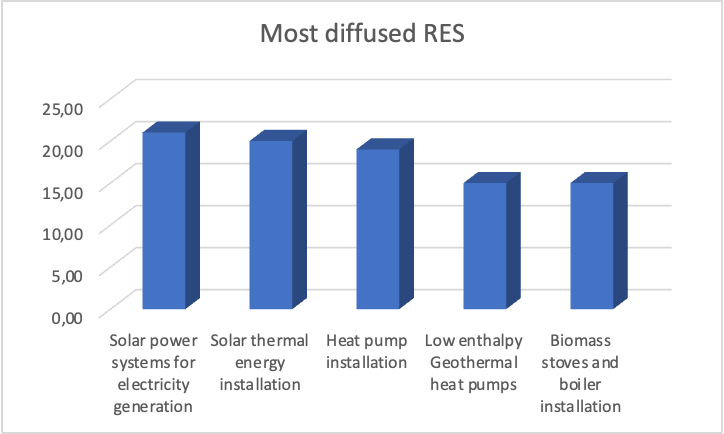

The ARISE platform can provide the support needed to achieve a higher maturity level in any sector and for any target as it is based on micro-competences. Thanks to the platform, the new technologies can be introduced directly by their producers. They can use it as a mean to provide training materials to be able to design, install and maintain new equipment and/or materials that can improve the energy performance of buildings.
The implementation of digitalisation shows that the problem is more related to the lack of a full maturity on the demand side. Designers are usually ready to implement digitalisation as it facilitates their work, but if the demand of public administration and both public and private owners does not increase, it cannot be fully implemented in the supply chain. The consequence is that the owners cannot profit from the benefit of managing all the information linked to their assets in order to decrease the cost of management and maintenance.
In the following diagram we can observe the different levels of maturity as average of the situation in each of the partners’ countries.

If the constructors do not implement the model received by the designers with the information of the products and equipment used and installed, the owner gets only marginal benefit from the BIM model produced by the designer. Therefore, there is a strong need to increase the comprehension of the benefits introduced by the full implementation of BIM in the supply chain. This analysis is also useful for training program developers and providers, providing them with directions on how to profile their programs.
In this case too, the ARISE platform can be beneficial as the European chapters of buildingSMART international are working for an agreement aimed at increasing awareness of the benefits of BIM along all the supply chain using the training materials developed for the individual qualifications available for free to everyone.
For more information, download the Report here.
How are climate change, the construction industry and BIM connected?
It is common knowledge now that the construction industry is one of the major culprits of the ecological footprint. The cement industry alone is in third place for the production of CO2 after the countries of China and the USA. Time is running out, and all designers in the sector need to begin to work collaboratively to the transition towards more sustainable paths.
However, designing zero energy buildings is not enough. We must also reduce the use of materials that pollute excessively and the overly exploitation of natural resources. We need to put in place plans for reusing and recycling, and the materials to recycle should come also from waste, and not only from the demolition of buildings.

In Copenhagen, during the conference organized on December 7th by KEA (Copenhagen School of Design & Technology), it was underlined the importance of architects and engineers considering the use of appropriate materials already in the preliminary design phase. Also important is limiting the use of reinforced concrete to those buildings and structures that really need it and, wherever possible, considering alternative solutions that can be even more performing. It is also necessary to reuse the material resulting from demolitions in a smart way.
In France and Denmark, in application of the European recommendations for the reduction of the ecological footprint, the law requires the declaration of the total of CO2 produced. Not only as LCA, i.e. a simple certification of how much CO2 that particular building produces, but it is also required to justify the choice on the materials, which must produce less CO2 than alternative solutions.
During the debate following the conference it was rightly pointed out that "virgin" materials often have a lower cost than the recycled ones because the production process from raw materials is simpler than the recycling of existing materials, especially if their composition is unknown. Soon however, to encourage recycling, in Denmark it will be introduced a tax on the production of CO2, which will make the price of the two choices comparable and will possibly make recycled materials more advantageous.
In Denmark, they initiated pilot cases in which, for example, it was approved the project of a nursery school in place of an old abandoned school, provided that the materials derive from the demolition of the old structure. In place of the old school there are now two soccer fields and a nursery school built sustainably and on a zero impact criteria. This thanks to the saving of "virgin" material which normally requires a large energy contribution, both in production and for transportation. Furthermore, wood has once again become the first choice, both for new houses and for renovations.
The role and contribution of BIM in all of this was also discussed. A software was shown that BIM allows to evaluate the CO2 footprint, just as there are already 4D and 5D software that allow to evaluate times and costs. Each product is connected with its ecological footprint, i.e. with the carbon dioxide produced for its production. In this way, it is possible for the designer to attribute a real value to the ecological footprint of the entire building.
It is clear that the role of material producers is becoming more and more Impactful. They must transition from providing the values that certify the "ecological footprint" in simple pdfs, to the transmission of data that can be directly read by design software. To allow this, the bSDD is already available, i.e. a service that buildingSMART International makes available to "translate" any property and geometry into data that can be read by modeling software.
Essentially, it is enough to connect these properties and values to each element. As an example, the "wall" properties can be linked to reinforced concrete, solid bricks, hollow bricks, laminated wood, recycled panels and so on to which the manufacturer will have to associate the corresponding "CO2/metre" properties. The software, at that point, can directly calculate the final footprint.

By changing the material, in a few clicks, the final value can automatically be updated. This will facilitate the final selection.
However, there is still a long way to go. For example, we need to work on new legislative instruments that support this approach. In public tenders, it will be necessary that the ecological footprint has a weight in the selection, so that designers are encouraged to make more ecological choices. It will also be important to help small producers of recycled materials to certify their products with the CE mark in order to be able to place them in the market. It will also be necessary to properly train manufacturers and the workforce to use these new products correctly. Finally, it will be necessary to support research in this sector.
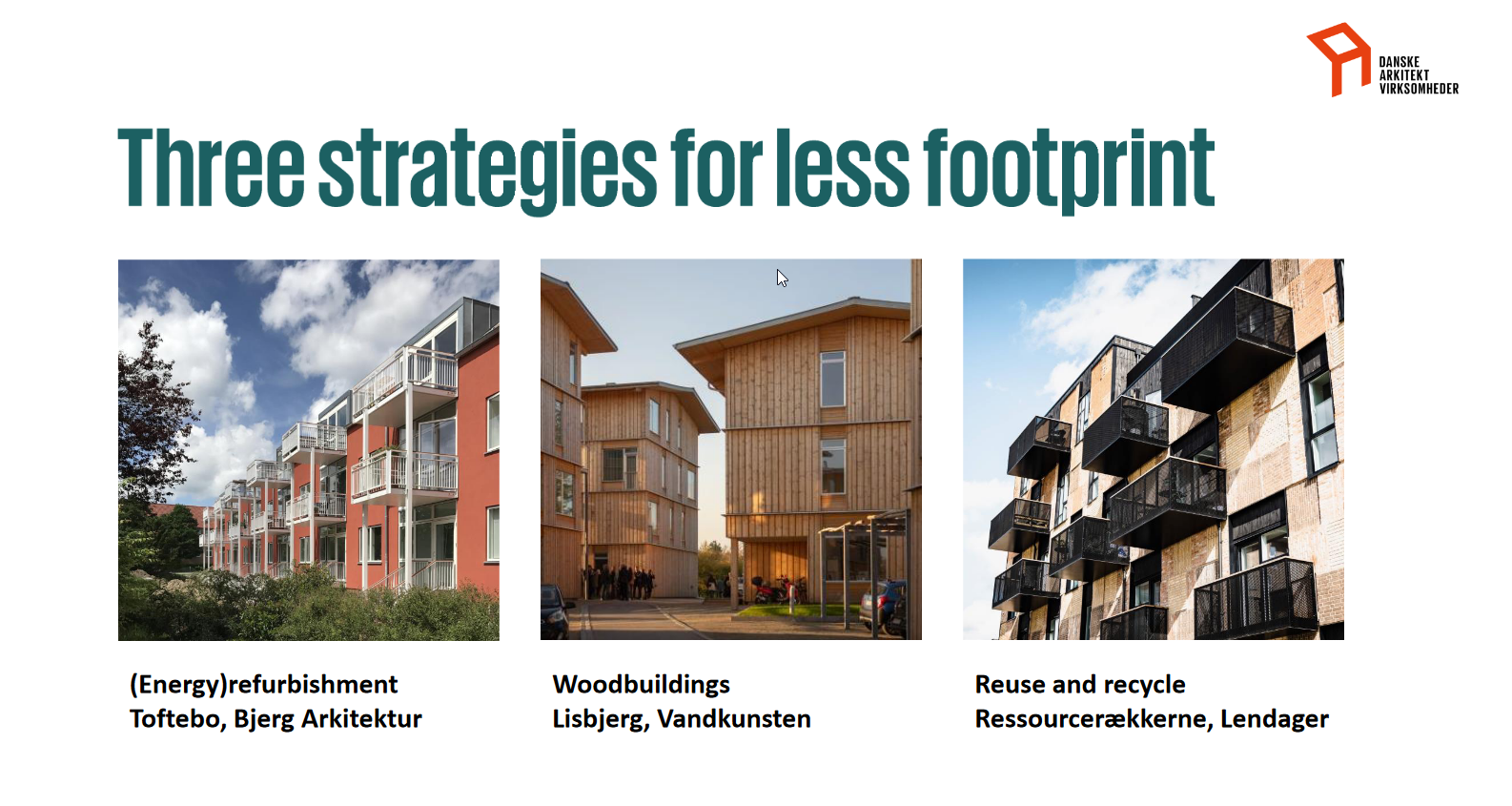
These topics will also be addressed during the next buildingSMART International Summit, which will be held in Rome from 27 to 30 March 2023.
All the European chapters of buildingSMART will also meet, on this occasion, with the European Commission (DG Growth) to look for agreements to ensure that part of the substantial funding foreseen for the construction sector will be directed to these activities. We invite you to participate numerous at the Summit, that is open to all interested parties in the sector, members and non-members of buildingSMART.
Presentation and images by Lene Espersen
Article by Anna Moreno and Caterina Nissim
